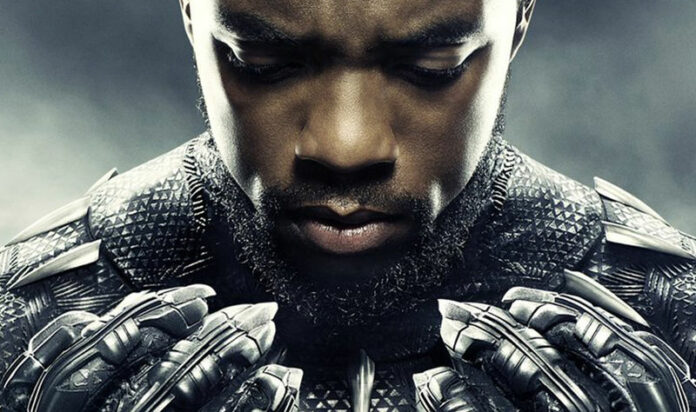Seen from space, most of Africa can accurately be labelled “The Heart Of Darkness”— for although it is home to nearly a billion people, it generates just 1% of the world’s electricity. One of the darkest places on the continent is the East African nation of Wakanda—but in Ryan Coogler’s film, Black Panther we learn that our perceived lack of electric lighting is very, very wrong. For Wakanda is the only place on Earth depository for a rare-earth, meteorite called vibranium, and centuries of isolationist leadership has invested in a vibranium-powered infrastructure so modern, it makes other countries seem antiquated. It can’t be seen from space (or on the ground, either) because decades before the first satellites were launched, the technologically advanced nation erected an invisibility force-field around itself to protect it’s secrets, its people and its culture.
The Black Panther film opens in 1992, with kids playing pick-up basketball in inner-city Oakland (Coogler’s hometown). Above them, two gangsters plotting a robbery are interrupted by a knock on their apartment door. A quick glance through the peephole reveals “two Grace Jones-looking chicks carrying spears,” and what happens next impacts every scene that follows.
Flash forward to today, where Prince T’Challa (Chadwick Boseman) returns to his homeland to assume the throne of his recently deceased father. As is often the case with generational transfers of power, things do not go smoothly. Five different tribes call Wakanda home, and their leaders have different visions for the future. Tellingly, the coronation takes place in an open-to-the-sky natural amphitheater above a tumbling waterfall.
The new king is supported by a cadre of powerful women: his mother, Queen Ramonda (Angela Bassett); his inventive, smartest woman in the world, younger sister, Princess Shuri (Letitia Wright); and the all-female Dora Milaje (Honor Guard) including General Okoye (Danai Guirira); and his one-time lover, warrior-woman Nakia (Lupita Nyong’o). Before he assumes the throne, tradition dictates that a king-to-be can be challenged to one-on-one combat by any Wakandan tribal leader. With all this set-up, there has to be a fight, and the challenger who steps forward is the muscular M’Baku (Winston Duke), Chief of the Mountain Tribe.
A semi-secret identity is included with T’Chala becoming king. Ingesting the juice of the sacred Heart-Shaped Herb, he acquires super-human strength and wisdom and when he dons his Shiri-designed, energy-absorbing, vibranium super-suit (more powerful than anything worn by Ironman), he becomes the indestructible Black Panther.
The list of kingly duties is a long one. In addition to visiting Wakanda’s traditional, dirt-street village markets, and checking on the city’s high-tech building boom and speedy transportation system, he must clean up a few of the messes left over from his country’s previous appearances in Marvel Universe movies. At the top of the list is capturing Ulysses Klaue (Andy Serkis) the South African arms-dealer who acquired a small cache of vibranium and fashioned a vibranium-powered cannon that folds into his artificial arm. Standing at Klaue’s side, is the American soldier/assassin Erik Stevens (Michael B. Jordan) a Black Ops, CIA operative trained in political destabilization and regime-change.
Learning that Klaue is planning on selling vibranium to the CIA, T’Challa dons a tuxedo, makes Okoye and Nakia disguise themselves with uncomfortable wigs and high heels and enters the South Korean casino meeting place. Inside, T’Challa chats with undercover CIA operative Everett Ross (Martin Freeman) just before Klaue and his henchmen arrive and the James Bond/Kill Bill style gun battle ensues. Ross stops a bullet, and his bleeding is staunched by a Kimoyo bead until he can be transported back to Wakanda where Shuri has to “fix another broken White boy.”
We soon discover that not only has Eric Stevens adopted the name “Killmonger,” he is also T’Challa’s first cousin (with a royal right of challenge). The animosity between the cousins comes to a head when Killmonger returns to Wakanda, and argues against isolationism: “[There are] two billion people all over the world who look like us whose lives are much harder, and Wakanda has the tools to liberate them all.” Unfortunately, Killmonger is a product of the USA’s military/industrial complex, and he finishes with his vision of world domination: “The sun will never set on the Wakandan Empire.”
Director/co-screenwriter Ryan Coogler (and co-writer/creators Joe Robert Cole, Stan Lee and Jack Kirby), have created something very special with this film. For the first time in a big-budget blockbuster, female and male Africans are portrayed as intelligent, brave, wise, thoughtful, and politically savvy human beings, in an action/adventure/superhero movie that is just as intelligent—and delightfully fun to watch!
Comments? E-mail gi*********@*****st.net








